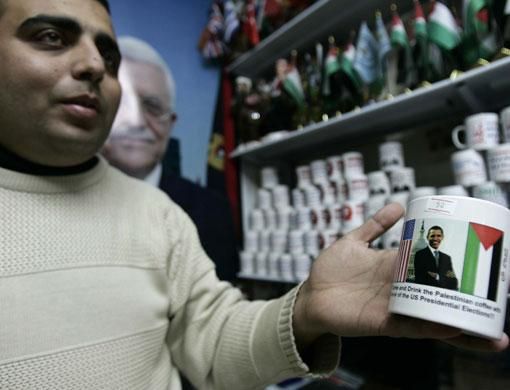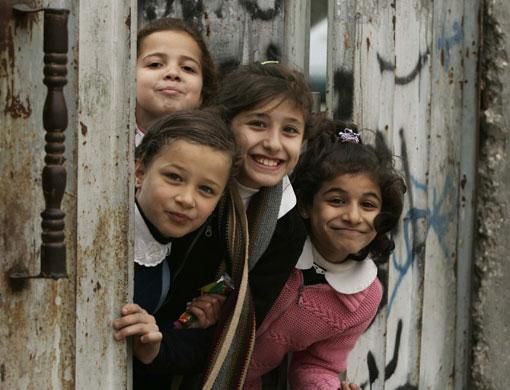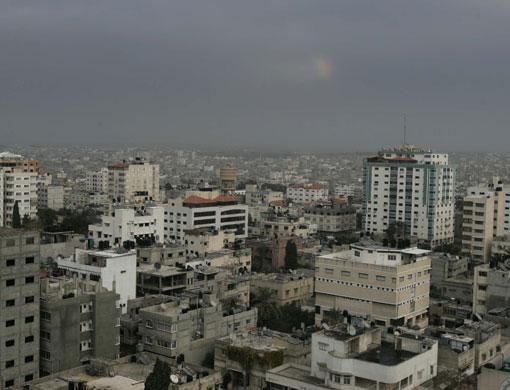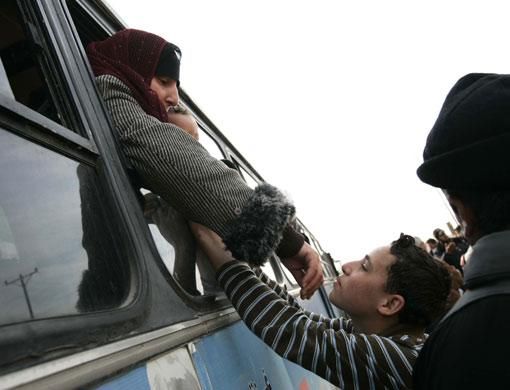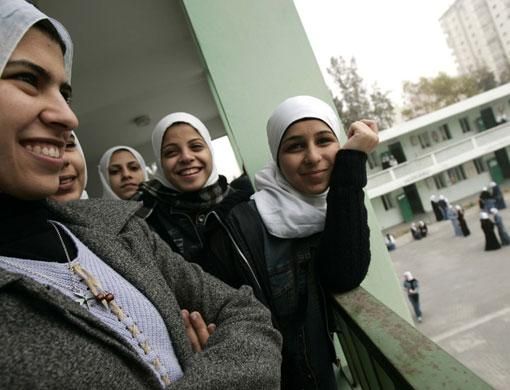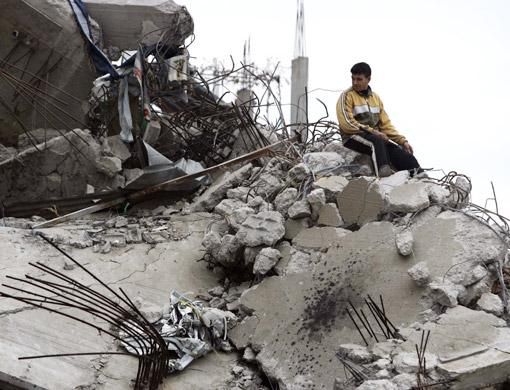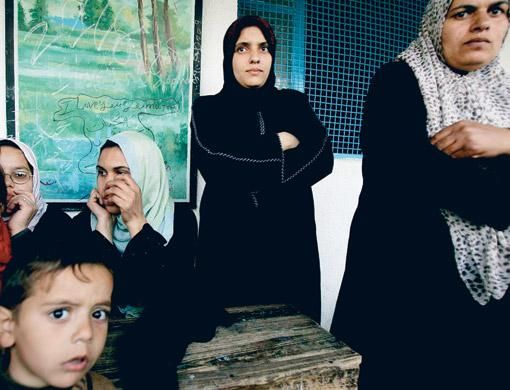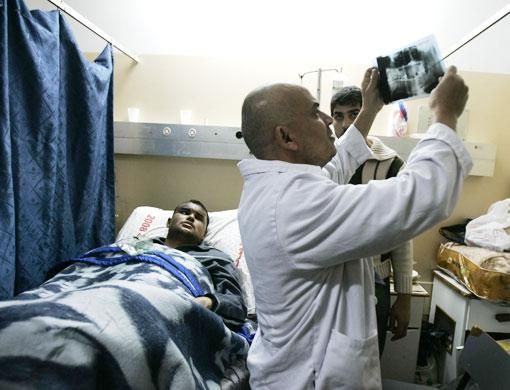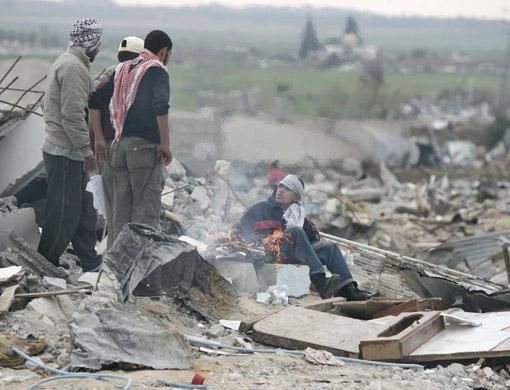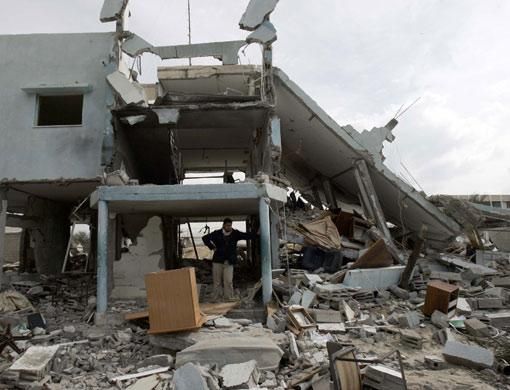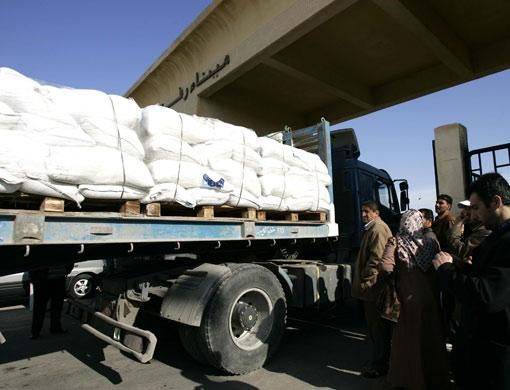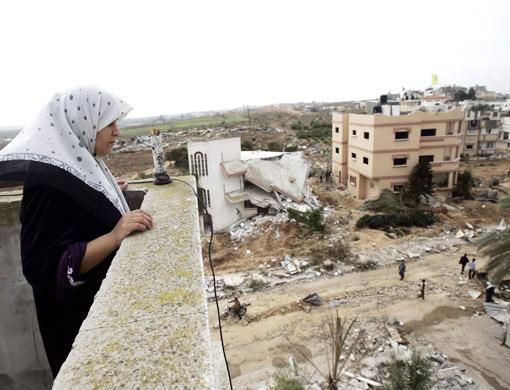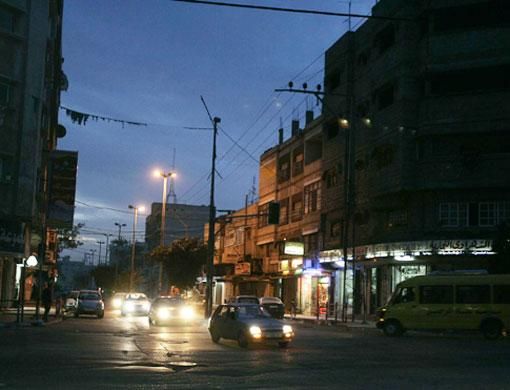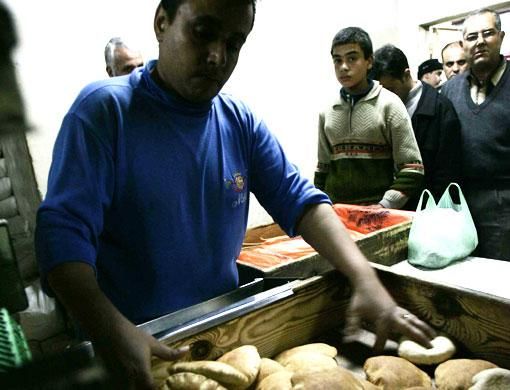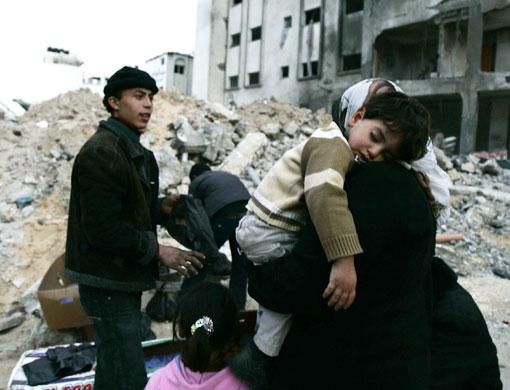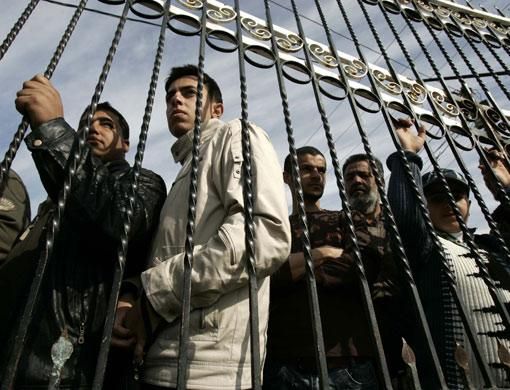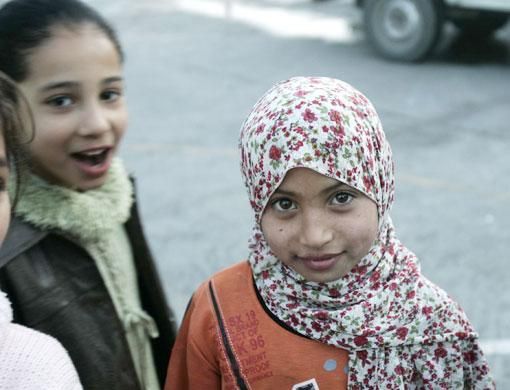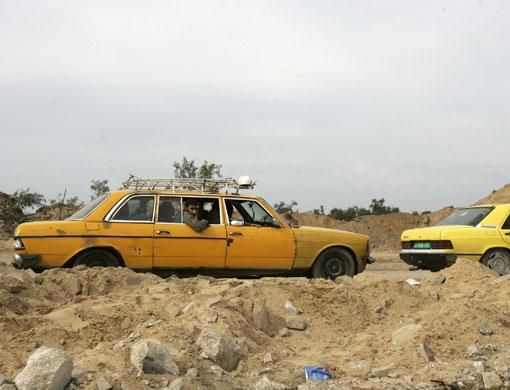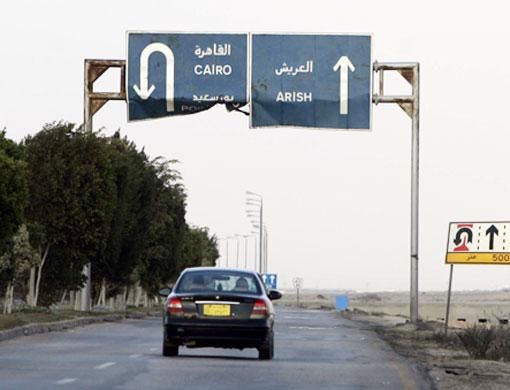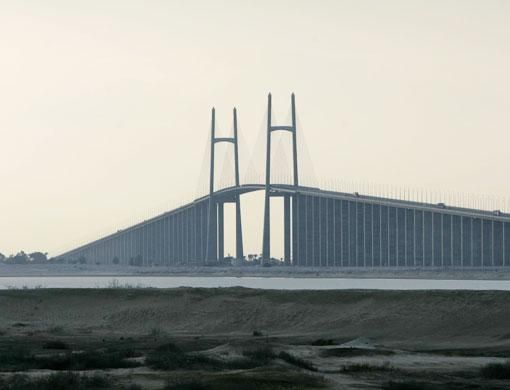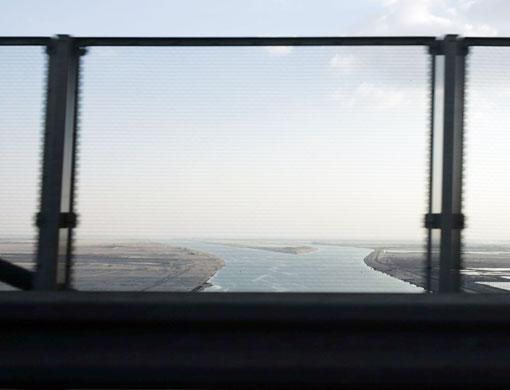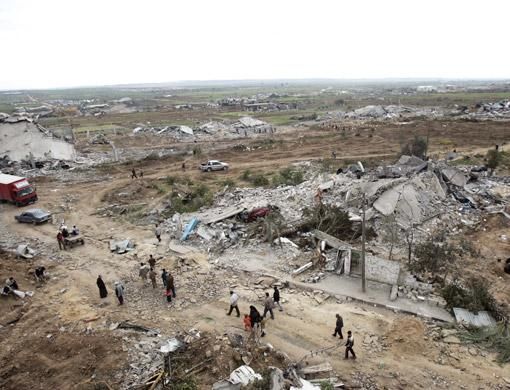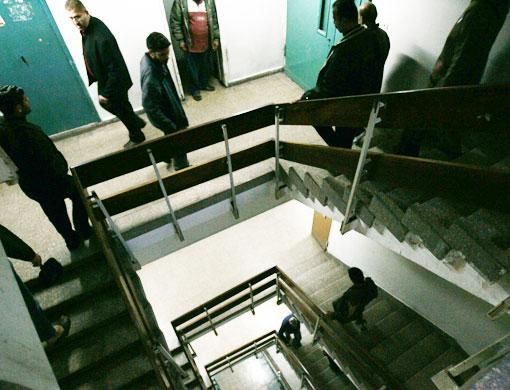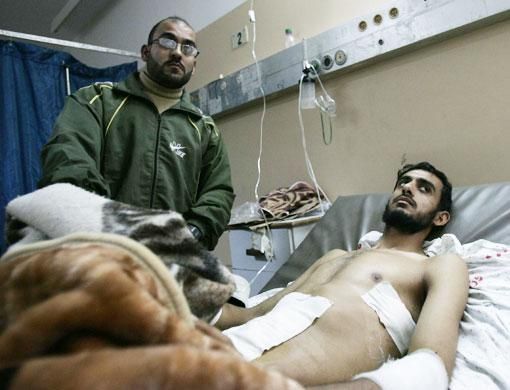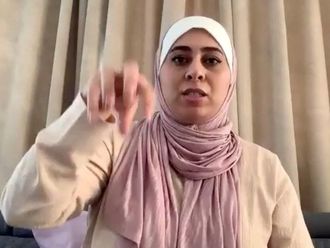Gulf News videographer Ashraf Helmi and photographer Megan Hirons have travelled to Gaza to document the situation on the ground following the attacks by Israel.
They will be filing blog entries, photos, videos and stories. Bookmark this page and refresh for regular updates of their thoughts and experiences.
Tuesday, January 27
18:50pm (UAE time) Megan Hirons:
Ashraf and I are back in Egypt now. I have showered and put on new clothes. I found the quiet of my hotel room oppressive, so have walked over to the University Engineering building next to the hotel to take advantage of their free wireless and vibe off the energy of the students here. I'm going to write my last blog entry after this, but it might not be posted right away.
11:40am (UAE time) Megan Hirons:
It is our last morning here and we still have more work to do. I am trying to reach someone by phone to finish off an article and Ashraf and I have one piece to write together once we get back into Egypt.
It all seems a little never-ending. The upside is that once we head to Egypt we have a couple of free days to relax and enjoy the city. Personally, the central market is calling my name.
1:20am (UAE time) Megan Hirons:
Many of the journalists left today, at least the ones who aren't permanently based here. We said goodbye to the Danes, who so graciously drove us into Gaza City, and who have shared our breakfast table each morning.
They were worried that the border wouldn't be open, but seeing as we haven't seen them since this morning, my guess is that they got across just fine.
Ashraf's journo friend also left today, and since there are now rooms in the hotel, we each have our own again.
Tomorrow we leave Gaza, and head back to Egypt. I can't really wrap my head around it. My mother will be relieved, that I do know. I didn't tell her I was coming, knowing that she would worry, and figured I would tell her once I was back.
Unfortunately for me she was on the Gulf News website and saw my name. She was surprisingly calm in her email to me. She told me that she wasn't surprised that I was here, or that I had kept the information to myself and asked me to stay safe.
When you only go on assignment with a single change of clothes, there's not much to pack up before you leave, luckily. All I really have left to do is write this, send off my photos from the day and pack up my three pairs of socks.
We had a really exciting day today, down in Rafah. I won't go into details now, but keep your eyes on the paper, for the photos and stories that we covered down there. I'm not sure what I expected when they asked me to go to Gaza, but it wasn't where I found myself today.
Monday, January 26:
11:30am (UAE time) Megan Hirons:
I wore both of my shirts and my fleece to bed last night. It was freezing in our room. My shower was lukewarm, so I haven't even bothered to attempt one this morning. I just splashed some cold water on my face and was ready to go.
I'm waiting for a phone call from the Greek Orthodox priest to go around for a visit to his church, which dates to the 5th century. There is a tiny Christian community here and I'd like to write a feature on them.
Ashraf is sleeping in this morning. When I went to bed, well after midnight, he still had another hour's work on the story he was writing.
The pace is starting to show on both of us. I realised all of a sudden yesterday evening that there wasn't a moment to myself all day when I wasn't working. I had to go upstairs for about an hour and just lie down with my book, and not be thinking about photo captions, lead sentences, or the like.
I didn't know Ashraf that well, when we started off on this crazy trip. The video and photo departments function quite independently. We've been able to work together efficiently, with no friction or conflict, which is amazing for two people thrust into each other's company for days on end.
While I am waiting for the phone to ring I am going to go through my photos from the past week, and see if I can send some for a wrap up.
Sunday, January 25:
10:45pm (UAE time) Megan Hirons:
Gaza is an amazing place to be a photographer. In the Gulf photographing people can be a challenge, especially woman. I find that I get one of two reactions. Either people get upset that they are being photographed, or they want to pose for the camera. As a photojournalist, the photos that I most like to take are when people are in their natural environment, seemingly unaware of the camera.
In Gaza it is very different. With one of the highest concentrations of media in the world, the people of Gaza are used to being photographed. Not only this, but they welcome the eyes of the world. The Palestinians don't have an army to fight with. They have the rocks they throw at Israeli soldiers and they have their tears.
When the BBC's Alan Johnston was kidnapped in Gaza there was general outrage among the population here. The media is the friend of the Palestinian people and they know it.
I spent the afternoon shooting fishermen at the port. It was an amazing feeling to be able to get in close and photograph them at their work without being yelled at, stared at or hassled. I stood directly behind a group of men casting their rods into the sea, and not a single one turned around. They just make it easy to take great documentary photos.
In Dubai, I think that the phrase I hear most is 'not allowed'. People love to tell me that I'm not allowed to photograph things. Once, in the supermarket, as I was taking pics of people stocking up on food for Ramadan, I pointed my camera at a full shopping cart, with a large bag of onions perched on the top. The man who's cart it was looked over at me and told me that it was not allowed. I think I laughed out loud. 'It's not allowed to photograph your onions?', I asked him incredulously.
The Palestinians are so blasé about being photographed that they don't even acknowledge my presence. Or if they do, it's to wave me over and then go about their business, with my camera capturing every nuance and expression. They make my job really easy, and I thank them for that. I thank them for the access they have given me to their lives, while at the same time the need for it saddens me.
11:00am (UAE time) Megan Hirons:
I slept seven hours last night--three hours after waking from my nap, and I could still have slept more. This is our 7th day in Gaza and we've been working flat out from early in the morning to late at night every day.
Ashraf is tired too, I can tell. We must be running on adrenaline, since we're not sleeping enough or eating properly.
Watch a video on what lies ahead for a victim of the violence in Gaza
I'm drinking about five cups of coffee a day, way more than my usual one or two. Really, what I wouldn't give for a nice bowl of broccoli and spinach right now.
We have two feature stories to work on today in Gaza City, and two in Rafah tomorrow. After that we don't know. I sent an email last night asking how much longer they want us to stay, and am waiting to hear still.
Saturday, January 24:
11.45pm (UAE time) Megan Hirons:
I've just woken up from a three-hour nap and feel much better. Ashraf has finished his video, so now I can have the computer to file photos and write.
Ashraf and I have been co-writing many of our stories, which has been a new experience for me. It's actually a little surprising for a videographer and a still photographer to report. Normally a reporter would go as well, to concentrate on the writing.
Ashraf worked for many years as a print journalist, before moving into video, while I have done some writing for the paper, mostly features and not news, though have been asked to cover a news story in a pinch.
I think that we write really well together. My style tends to be slightly flowery, though I'm pretty good with the illustrative descriptions. I find Ashraf tends to write in a more newsy style. Together we seem to balance each other out well, and we are both satisfied with the collaboration, striking a happy medium between the facts and the description.
We've just sent out our story ideas for the next two days, but are wondering how much longer we will be staying.
5:45pm (UAE time) Megan Hirons:
After filing our school stuff, we went out to the Gaza Zoo, or what's left of it. It's in a terrible state, and we'll be writing an article about it to go for Monday's paper.
On the way there we saw an awesome mural of all the dead Fatah leaders, so stopped on the way back to take some photos. We asked the soldiers stationed there what was inside and they took us into the compound, explaining that it had been a prison, for civilians, military and police.
One of the soldiers gave Ashraf his gun, an AK47, so I could take a picture of him with it. "Is it loaded?" he asked. "Yes", the reply. They asked if I wanted to do the same, but I politely declined.
They've asked us to take a few photos of each other, while we're working in the field, and I have plenty of good pics of Ashraf doing his thing with the video camera. Ashraf keeps forgetting to shoot me, so finally managed a couple of pics while I was taking photos of the soldiers' guns. Thanks man.
We're back now to write our stories and consider what to focus on for the next couple of days, though we have some ideas in mind.
1:25pm (UAE time) Megan Hirons:
Okay, the computer is working again. I am going to file photos of the school and a rainbow shortly.
12:50pm (UAE time) Megan Hirons:
Ashraf and I are having serious computer problems. We keep getting an error screen and the operation system isn't loading.
Ashraf has taken the laptop to a computer shop to see if there is something we can do. We would be stuck in a really bad situation if we don't have a laptop to work on. It's not insurmountable, but will make life much more difficult for us here.
Anyway, we woke up late this morning, and I am still grumpy. It is the first day back at school for students here, so we visited two girls schools, one primary, one secondary to take some video and photos.
The young women at the secondary school were a ray of sunshine, thank God. So full of life; so positive. It was really nice to see.
3:38am (UAE time) Megan Hirons:
I can't really recall where I left off in my previous blog. I think it was before Friday prayers. I was supposed to go out to Jabaliya camp with Mohammad from Reuters.
After a few phone calls it was clear that he was stuck elsewhere in Gaza and wouldn't be able to meet me. I didn't want to miss the prayers, so called a cab and got Mohammad to explain to the driver in Arabic where he should take me. While in the taxi I wrapped my head in my scarf, not wanting to offend anyone.
I arrived at a large square beside a ruined mosque, just as the local residents were gathering. There was quite a bit of other mediamen there too. I guess word got out that the prayers would be said outdoors.
The square was filled with men, laying down their colourful prayer rugs in lines. The Mu'ezzin sang the adnan, the call to prayer, then passed the microphone to the Imam, who began his sermon. I only understand a little Arabic, and I would have loved to have really known what was being said.
Nonetheless, as I circled the square, looking for my photos, something in his voice and the solemn crowd, and the destruction around me, struck a chord and I found myself crying. I didn't even know why.
I looked for a spot to get an aerial view of the scene, found an open door nearby, and gestured to one of the young men standing nearby that I wanted to go up. He nodded.
I climbed the stairs to the roof, and found another photographer already there, a German woman from Geneva. She moved aside to let me have a view. It was the perfect spot to shoot from.
About half way through the prayers, I ran down to get a few more pictures from ground level and then quickly the prayers were over and men were greeting each other, chatting, then walking back to their homes with their prayer rugs slung over their shoulders.
After a short walk around the neighbourhood, I decided to head back to the hotel. I walked up to the main road, and realized that for the first time I was truly out on my own in Gaza.
I put my hand out for a yellow taxi, only for it to drive by. Another car stopped on the other side of the road. It didn't look like a taxi, but the man said he would take me where I wanted to go.
I few thoughts passed through my head, mostly relating to the inadvisability of getting into cars with complete strangers who may or may not be cab drivers, but then I figured that you kind of have to give in and trust people and see what happens.
As luck would have, the man who drove me was kind and spoke a little English and wasn't a kidnapper. He knew exactly where the hotel was and only charged me about 50 per cent over the odds for the pleasure of his company.
After I filed my photos, Ashraf and I had planned to go do an Obama vox pop, but as we left the hotel, it started to rain. Not wanting to get the camera wet, we headed instead for the Reuters office, where they kindly let me charge my batteries, and a cameraman gave Ashraf a spare tape for his video camera. We love the Reuters people.
On our way down from their 12th floor office, we looked out the window and Ashraf spied a rainbow peeking through the clouds. I took a few photos, but it was so far away, that I'm not sure that the photo will come out.
We've had a few computer issues tonight, so I haven't actually had a chance to look yet, and since we're way past deadline, it's not really a priority.
The death and horror stories all around are starting to really wear on my energy levels. It seems that every single person I meet has a story to tell. No one is unscathed.
It's hard to go 20 minutes without the mention of somebody's tragedy. I'm normally a cup-half-full kind of girl, but not today.
Friday, January 23:
11:45am (UAE time) Megan Hirons:
We had checked out of the hotel yesterday, before we were asked to stay a little longer. Unfortunately by then our hotel rooms were given to other arriving journalists. Luckily, there was one left, with two single beds that Basel the manager said we could have. Ashraf's journalist friend, Erin, also needed a place to sleep, so they kindly put another mattress in the room and the three of us shared the room.
Hotel rooms are scarce in the city now that the borders have opened to the world's media. There are even two Swedish journalists sleeping in the storeroom in the basement, next to the flour and sugar.
I was talking through our stories with Ashraf this morning and realised that I made a mistake in yesterday's blog. The Palestinian doctor whose flat we visited has lost three daughters and a niece, not four daughters as I originally wrote.
The mistake happened as I was going on what other people had said, and Ashraf did his interviews in Arabic, and Saad didn't translate them. It was a good lesson in verifying facts before using them.
Today we have first Friday prayers since the Israelis left, and I'm going to photograph the event as Gazans pray in front of some of their destroyed mosques. It should be pretty powerful.
We have given Saad and Ahmad the day off, and I'm going to go out with a photographer for Reuters, Mohammed, who I met a couple of years ago in Dubai.
Ashraf will stay in the hotel to work on a video and write today's story.
Thursday, January 22:
9:30pm (UAE time) Megan Hirons:
I don't even know where to start.
We went to the UNRWA school again, looking for a family that was returning to their home, in the hope of following them back to it as they moved out of the shelter. While we were there a woman told us about a Palestinian doctor, who works in an Israeli hospital. He was at home with his 6 children when an airstrike hit his flat, killing four of his daughters and wounding his two sons.
We went to his flat, to see if we could talk to him. He wasn't there, but a neighbour took us up into what was left of his apartment.
The place was a wreck, a massive hole in the wall where the shells entered. I bent down to take a photo of the destruction, when all of a sudden I realized that the torn pages of notebooks in front of me were soaked in dried blood. The wall behind me was also splattered and a neighbour pointed to the ceiling, which was caked in I don't even what kind of body matter, but it was in chunks.
It was at that point then that this whole stupid mess became real to me, the dried, bloody remains of young children in this chaos that used to be housed with a family. Young girls tucked into bed for the night, wiped out. It shattered me and I'm afraid that ceiling will haunt me in my dreams. One of the neighbours stood in the room with us, his fist to his mouth, fighting back tears, as I fought back my own.
What else can I say? Lots of other silly things happened today – batteries got charged, clothes got bought, people got interviewed, but all I can think about is that wreck of a room, covered in blood, desecrated by hatred.
12:30pm (UAE time) Megan Hirons:
Our Editor-in-Chief has asked us to stay a little longer, so we are currently trying to sort out the details of this.
I need to find a charger for my batteries, although I have heard that there is a girl in another hotel that has the kind of charger that I need, though should still be okay for the next 2 days if I am careful.
We have almost run out of money, so are having some wired to us, and we are trying to sort out what we will do now, since we will stay in Gaza city instead of heading to Rafah.
It'll be too late today to file any news article for the paper, so will have to go with the mood piece I wrote last night plus photos. Ashraf has only 30 minutes of video tape left, so will have to find more today. Lots of gunfire in the city still, every 15 or 30 minutes we can hear it.
11:30am (UAE time) Megan Hirons:
The gunfire has increased a lot now; in fact some is quite near. I'm also hearing bigger explosions - maybe artillery or gallon guns. Our driver says its Hamas fighters firing at overhead planes.
10:10am (UAE time) Megan Hirons:
I've woken up early this morning, before my alarm, but feeling a little more refreshed than when I went to sleep.
I finally had the chance to pick up some contact lens solution and a case for them, so am happily half blind at the moment as I type away. I also got some deodorant, however seeing as my clothes stink, I'm not sure it's going to really do any good.
Today's plan is to head back to Rafah, where Ashraf has a story he wants to work on as a longer feature, and then to the border, which hopefully will be open for us to leave, since we have almost run out of cash.
Ashraf is going to hit an ATM this morning, since we don't actually have enough Shekels to pay our hotel bill at the moment. We tried to use it last night, but there is only one working ATM nearby, there was a line of about 25 people waiting to use it, and that too was being repaired when we got there, so decided not to wait.
Last night was our first night we really ventured out alone, without either a driver or a fixer. The streets are very dark, since there are no street lights and almost all the buildings are dark. Gaza shuts down early it seems, and there are not many people out and about. The upside is that we could see the stars fairly well, with familiar Orion the Hunter standing guard above us.
We passed a Quran study class in a little park beside the bank. At first we got into line to use the ATM, but then started getting some strange looks. Since the machine was down anyways, we decided to go back to the hotel, recalling the many papers we had signed about our safety and security.
We took a taxi to go meet a journalist friend of Ashraf's, who had crossed into Gaza a few days before us, when the airstrikes were still going on.
She told us about shells dropping only 100 metres from her car and having to get out and run. And then she was in Khan Younis hospital when an airstrike hit just outside the compound, shaking the entire building. She said an amazing Palestinian family took her in and let her stay with them, sharing their precious resources with a complete stranger, an American. She said she'd never been so scared in her life, and she only had to endure a single day and night of terror, not the weeks that the people of Gaza have recently had to endure.
It was nice to get out of the hotel and visit, but by the time we got back it was 11:30pm and I still hadn't written my article. My heater was pumping out cold air, so I bundled up under the blanket to write, much as I am this morning.
I've just heard what sounds like gunfire, and a series of explosions. They sound reasonably far off. Two now sound closer and there is more gunfire. I guess I should get up and see if anyone knows what's going on.
Wednesday, January 21:
9:00pm (UAE time) Megan Hirons:
I am feeling absolutely exhausted right now. I think all of the stress and emotion of the last few days has finally caught up with me.
I've just finished editing the bulk of my market photos. I'm going to write a mood piece for the paper about life getting back to normal here but don't really feel like I'm quite up to the challenge at the moment. I might take a break and have some dinner before I conquer that.
I was sitting in the room earlier while Ashraf was transcribing his video voxpop. Even though I can't understand what the people are saying, the force of their words and their body language is very powerful. Presenting peoples opinions in text doesn't even compare with the sight of them actually saying the words themselves.
I can certainly appreciate the power of video, though it's such a different medium from photography. You'd think that the two would be more similar, given that they are both visual media, but what works for him doesn't at all work for my photos.
To take a great photo, you need to be able to show the entire scene in a single frame, where he builds his stories with a series of images, sometimes just shooting details here and there and then editing them together. Detail shots just don't really work for news photos.
Okay, the last of my photos have just sent, so will get back to writing a little later, when I will hopefully be more up for it.
3:55pm (UAE time) Megan Hirons:
We're back in our hotel in Gaza City now. I've just heard a series of loud noises - perhaps explosions - not too far in the distance. Not too sure what is...
3:50pm (UAE time) Megan Hirons:
We spent the morning at the Shaikh Zayed City and have filed a joint article on that, with photos for the paper. Ashraf did a video voxpop and it was clear to see how angry people are still.
I have asked Saad to take me out to the central market. We passed through earlier on our way back to the hotel and it seems busier today than yesterday, so I want to go out and get a feeling for how people are feeling, and to do some photos. I think it will be our last full day in Gaza so I thought a nice wrap up piece would be in order.
2pm (UAE time) Ashraf Helmi:
We've spent the day in a town called Shaikh Zayed City in the north of Gaza. The city was built with donations from the UAE and only completed in 2004. The neatly ordered and well appointed residential areas were scarred with missile strikes and bullet holes.
The town, which seems to be a haven of peace and tranquility, is so close to the border that your cellphone picks up the signal of Israeli mobile operators.
But no-one - especially not the familes who had to shelter in these new buildings from the bombing and who were kept awake by the constant roar of F16s - can understand why it was the target of some attacks.
Midnight (UAE time) Megan Hirons:
Our satellite phone is almost out of power, and the mobile network seems not to be working, so I haven't had a chance to blog anything for hours now. Also the internet has been pretty slow. I have only a few photos from this afternoon to send tonight.
We've decided to stay on for another full day on Wednesday. We'll spend the morning walking around, talking to people and the afternoon trying to find some of the developments here that were funded by the UAE government. We've heard that they have sustained some damage, so we're going to try to see for ourselves. This is, of course, a rough plan, since things seem to change at any given moment, depending on what we stumble upon.
I am writing in my hotel room, under a fleece blanket. It's cold at night here, and my heater, which put up a stellar performance last night, seems to be lacking in enthusiasm tonight.
I've been wearing the same clothes for 2 days now and will wear them again. We decided to travel as light as possible from El Arish, Egypt, since we weren't entirely sure if we would even get across the border, let alone what our transport situation would be when we arrived.
We took one laptop between us, the clothes on our backs, toothbrush and toothpaste, and one pair of underclothes each. I brought an extra pair of socks, however Ashraf seemed only to be able to organise himself a single extra sock (I'm sure his mother will be proud).
Neither of us has deodorant, shampoo or soap. I didn't even bring my contact lens case or solution, so am into my second day with my lenses.
Basel, the hotel manager, has been a godsend, letting us use his hotel computer for sending the large video files that Ashraf has been compiling. My hair is looking a little worse for the wear, so I approached him tonight to ask if he had some extra shampoo lying around, and he returned with the blessed gift of a 1/3 full bottle of Head and Shoulders. You've never seen a happier woman than I was at that moment!
After washing up, I passed the bottle on to Ashraf, still busy editing video in his room, who was equally as pleased.
Happy, bundled, and clean, I will write a short story to go with my photos before turning in for the night, wondering what tomorrow will bring.
Tuesday, January 20:
17:45pm (UAE time) Megan Hirons:
Still sending photos – last batch now. The three guys have gone off to exchange some currency, since we are carrying only UAE dirhams and Egyptian pounds at the moment and will need either dollars or shekels to pay the hotel and Saad.
17:30pm (UAE time) Megan Hirons:
Ashraf has decided that he has enough video footage from the day to keep him editing for the next few hours. I'm in the process of sending my edited, captioned photos now and then will head off with Saad, the fixer, and Mohammad, our driver, to go to the refugee camps north of here. We had intended to go this morning, after hitting a dead end with the UNRWA feeding programmes, but got detoured when we saw the destruction of Jabilya town.
Ashraf is in a heated discussion with Saad about the tunnels in Rafah that have been used to smuggle goods into Gaza. Saad is asking about jobs at Gulf News, and Ashraf is trying to use getting access to the tunnels as leverage.
Ahmed is just back with a new tire for the car, since we had a flat on the poor roads this morning.
I am multi-tasking, trying to write this blog while my photos slowly attach to an email.
2:15pm (UAE time) Megan Hirons:
We are on way our back from Jabliya, which is just north of Gaza City. The place looks completely bombed. The whole road leading up to the Israeli border is torn up and buildings from each side of the road are just flattened.
We can see people living in tents. There are also people sitting outside their homes and next to a bonfire. There are some cars on the roads but it is mostly just carts drawn by donkeys and horses.
It looks like an earthquake has hit: Not a single building is standing without some sign of destruction.
We're just walking around. I am starting to wear a headscarf now since most people here are covered up. Someone actually advised me yesterday to wear one.
We're on our way back to the hotel now. We should be there in the next ten minutes and we will be filing photos and more stories.
2:10pm (UAE time) Ashraf Helmi:
It is not an easy experience photographing the scene here because it looks pretty bad. There's just scenes of destruction everywhere. But we are okay, and luckily we have a guide to help us.
2:05pm (UAE time) Megan Hirons:
Just leaving Jabliya village in northern Gaza now. It was completely destroyed. I have never seen anything like it. Every building was flattened.
We're headed back to the hotel to file more stories and pictures now.
12:05pm (UAE time) Megan Hirons:
We are now at the UNRWA headquarters looking for someone who can tell us about their feeding program and where food aid from Dubai is being distributed. No one there knows. We will head to the refugee camps directly and will try and find a school there.
11.15am (UAE time) Megan Hirons:
Ashraf and I are up and waiting for our guide, Saad, with car and driver, so that we can start our day. They are 45 minutes late now. We have filed articles last night and this morning. Ashraf sent four videos overnight after winning a fight with the local bandwidth.
On the agenda for the day is visiting an UNRWA school, since the Mohammad Bin Rashid Al Maktoum Foundation has donated food and milk to feed those sheltering in UN schools.
We will try to get our "local" story. Then we will go up north to the Jabilya refugee camp. We've heard it has been flattened by airstrikes and people are only just starting to return to their homes. We don't know what we will find there.
We will keep you posted...
09.20am (UAE time) Ashraf Helmi:
Syed asked why we had to sign a piece of paper when we were in Cairo. Basically, the Egyptian Ministry of Interior requires everyone travelling to Gaza to obtain a letter from their embassies stating that they are aware of the risk of travelling there. Also, at the Rafah border, the Egyptians also require you to sign a similar form. It is a way of indemnifying themselves against any injury or death.
Monday, January 19:
9.35pm (UAE time) Megan Hirons:
Once we reached the Palestinian side of the Rafah border, we realised that we needed to arrange transportation through the Gaza Strip. We hadn't organised anything ahead of time, not knowing if we would even be able to get in.
Luckily a couple of Danish journalists had a car and driver waiting for them, and invited us to travel to Gaza City with them. In the car was also their 'fixer' Saad.
A fixer is a local contact, usually a journalist, who has plenty of contacts and whose job it is to facilitate visiting members of the press. They'll usually help with arranging accommodation and transport, as well as setting up meetings and interviews. Fixers are an invaluable asset to any journalist travelling to a foreign and sometimes hostile or dangerous location.
After arranging for a different fixer for the Danes, Saad agreed to become our fixer.
We drove along the single main highway that stretches from the northern border of the Gaza Strip to the southern border of Rafah. Along the way we stopped to photograph a local police station, in a residential neighborhood, that had been bombed.
Most of the cars on the roads are old and dilapidated, and they share the road with many a donkey cart, hauling people and goods along the side of the road. The roads are torn up, many from the tracks of the Israeli tanks that only withdrew recently and there are wires hanging from some of the buildings, some hanging low across the main highway.
All the way to Gaza city there is evidence of the recent bombing campaign – mosque towers hanging askelter, buildings half standing and shattered glass splayed around. We passed a very new-looking mosque and a stadium-like building and I wondered at the tenacity of a people that keep rebuilding only to see their infrastructure torn down again and again.
Saad gets a little excited about showing us some of the scenes of destruction in Gaza city. However, all four of us (myself and Ashraf and the two Danes) were all under time pressure to file our stories and photos before deadline, so we try to curb his enthusiasm and head to the hotel where the other two have made reservations.
Luckily there were rooms for Ashraf and I, and the sweet bliss of wireless internet, so we filed then and there in the reception.
5.45pm (UAE time) Megan Hirons:
It's been a really busy, and really tough day. We'll be filing pictures from Gaza as soon as we get the chance to.
5pm (UAE time) Ashraf Helmi:
When you get into Gaza City you begin to see the scale of destruction here. Entire buildings have been totally destroyed. I mean, there is nothing left at all. You can still see tank tracks. It's a pretty intense scene.
1.30pm (UAE time) Ashraf Helmi:
We were the third and fourth people through the border when it opened. We signed another letter to say that we are responsible for our own safety. We now have exit stamp and am on the bus out of the border area.
12.15pm (UAE time) Megan Hirons:
More and more people are arriving, but still no word as to when we might cross. some peopel came yesterday and were not allowed in. That means they get to go first today.
11.22am (UAE time) Megan Hirons:
We are at the border with Gaza now. It is closed and there are around 100 people waiting to get in, including journalists and doctors.
There are also four ambulances waiting to bring patients to Al Arish. We will wait our turn.
Sunday, January 18:
11.15pm (UAE time) Megan Hirons
We arrived in Cairo just as the sun was rising about the horizon. Anticipating Cairo's notorious traffic, I was surprised to find that even this bustling city is sleepy on a Sunday morning.
It seemed as if all of the police in the city had lined the main road into town to welcome us, standing in uniformed groups of three, as well as other single and plain-clothed, burly men with backs to the road and facing the buildings on each side of the street.
Our taxi driver enlightened us. "Mubarak is going to Sharm Al Shaikh today for talks with Sarkozy and Gordon Brown and the police are waiting for him to drive by".
He passed on a few other local tidbits, before pointing out a well-preserved Jewish synagogue and then informed us that "there are no Jews here in Egypt anymore". We let the subject drop.
Our first stop was the British Embassy, where we signed letters to the effect that we are mad to be going to Gaza and we are aware of the fact.
Actually, what the letter says is "We have strongly advised you to avoid all travel to the Gaza Strip. It would be reckless to travel to Gaza at this time. If despite this advice, individuals decide to travel, they do so at their own risk". I must admit I laughed out loud.
Letters in hand, we made a short visit to the Egyptian Ministry of Information, to collect another letter, along the same lines, essentially absolving everyone of responsibility for our actions.
After engaging a car and driver we began the estimated 400 km drive to El Arish, the nearest main town to the Gaza border and where the majority of relief efforts are based, crossing the Suez canal en route. We must have passed through about six police checkpoints, of which two asked to see our documents and letters.
After a few phone calls we found a hotel room at the Sinai University, which will hopefully give us a chance to speak to some of the students about the local situation.
Tonight we are meeting with some of Ashraf's contacts to get some more information and will also visit the El Arish Hospital, where patients from Gaza are being treated.
Our plan for tomorrow (Monday) is to get up early and make the 40km journey to the Rafah border crossing and try to get across.
Wish us luck.
If you have any comments, or questions to put to Ashraf and Megan about their time in Gaza, please fill in the form below. We will try to put as many of them to our reporters as possible but as they will be working hard in a dangerous area, only a few answers may be possible.
Your comments
It is an admirable attempt to provide the pictures of the situation in Gaza to the readers, by which millions of people are being made aware about the current situation (?Gulf News blog: Road to Gaza?, January 26). Life there seems to be just passing and we have to remember how Palestinian territory has been destroyed in the past by Israel. It is indeed a very critical, risky and great job being done by our brave journalists. My salute to both of them.
Shaikh Mohammad Ayyub
Dubai,UAE
Posted: January 26, 2009, 15:12
It is nice to see the pictures of smiling children at school after a long horror and tragedy. We got some relieve, thank you.
Syed
Dubai,UAE
Posted: January 25, 2009, 09:30
I have been following your diary since the beginning. Your post on the 22nd of January is very touching and quite good. I felt your pain, your words reached our hearts. I really hope people will not forget the Palestinians are being starved day after day now for more than 19 months. You should be proud of your work and be very careful. Thank you so much.
Salpha
Gatineau,Canada
Posted: January 24, 2009, 08:56
Great work and if you need more people so I'm ready for working with you.
Ahmer Jameel
Dubai,UAE
Posted: January 22, 2009, 17:52
It's really very sad to see. As I am from north of Sri Lanka I have experienced the sufferings of war. It's really very difficult. I pray for the people in Gaza. It really remembers me the sufferings of people from Vanni area.
It's really appreciated that the way UAE act to help.
Vanathy
Dubai,UAE
Posted: January 22, 2009, 13:25
Ashraf and Megan ..excellent reporting . Megan is giving the excact picure of Gaza throgh her words and pictures
Hashir
Dubai,UAE
Posted: January 22, 2009, 10:33
Hi,
Please provide a clear picture of people's suffereing..Good luck for your travel.
Thameem Yousuf
Ajman,UAE
Posted: January 22, 2009, 08:41
Your work is highly appreciated. Through you and your likes truth can be attained. I wish you the best of luck and full safety.
Nedal
Dubai,UAE
Posted: January 21, 2009, 12:16
Keep up the worthwhile effort! Our prayers are with you. Your experiences and encounters really give us the right perspective of the aftermath of Gaza attack.
Epi
Dubai,UAE
Posted: January 20, 2009, 13:25
Great Stuff!!! You guys are doing a great job. i can't wait to see the videos of what's happening in gaza. It's shocking to see a number of lives being lost. If Gulf News can do this why not the others... excellent move and keep it up.
Mathew Litty
Dubai,UAE
Posted: January 20, 2009, 13:23
Excellent job, would you please let us know the ground realities.
Tooba Sohail
Lahore,Pakistan
Posted: January 20, 2009, 11:39
I applaud your courage to travel at this time of instability and wish you all good luck. Perhaps your photos and report might open the eyes and hearts of those who haven't seen the destruction and air their voice to stop this naked aggression.
Hanif Thayyil
Sharjah,UAE
Posted: January 20, 2009, 11:27
Great efforts by Gulf News and the crew. I wish them good luck. Please let us know how can we suuport you.
Shafeekh
Dubai,UAE
Posted: January 20, 2009, 11:18
It is people like you that the world needs today. One needs self believe and dedication to go out there. May God bless you. All the best.
Zain Mousa
Dubai,UAE
Posted: January 20, 2009, 10:39
Need to make maximum videography and photography so that the world knows the furious and the criminal act of Israel. You really are the brave. Wish you all the best. God bless you.
Shaikh Mohammed Ayyub
Dubai,UAE
Posted: January 19, 2009, 17:10
Great effort is being taken to get the readers the latest updates from Gaza. Please tell us what they need there and how we can support them.
Othman
Dubai,UAE
Posted: January 19, 2009, 10:39
Wish you the best of luck going in Gaza. Tell us about the real situation in Gaza.
Thank you
Salpha
Gatineau,Canada
Posted: January 19, 2009, 08:31


